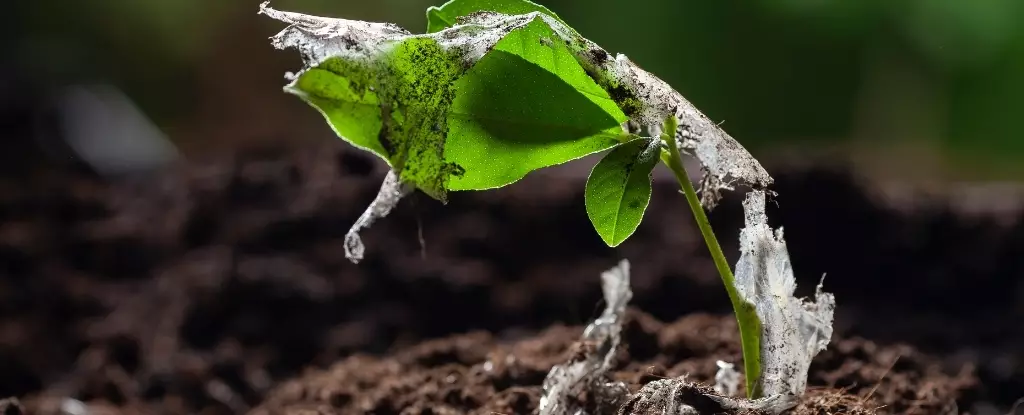In an era where environmental consciousness should dictate our agricultural practices, the disturbing truth of microplastics infiltrating our soils and food supply rears its ugly head. In a comprehensive examination conducted by environmental biotechnologist Joseph Boctor and his team, nearly 200 research papers unveil a grim reality: tiny plastic particles, laden with hazardous chemicals, are increasingly becoming an unregulated part of our crops. Imagine biting into a fresh salad, only to realize that it may contain rarely discussed contaminants—the very essence of sustainability is at risk.
With an alarming estimate that hundreds of thousands of tonnes of microplastics accumulate in agricultural soils across North America and Europe each year, the threat is tangible. The revelation that 22,500 tonnes of these destructive particles are introduced into UK soils annually through fertilizers and agricultural practices serves as a wake-up call to consumers and farmers alike. This is not merely an environmental issue; it’s a public health crisis brewing quietly beneath the surface, as our food chain unwittingly absorbs these insidious pollutants.
Plastic Mulching: A Double-Edged Sword
Agricultural techniques are meant to enhance crop yield and ensure food security. However, the widespread adoption of plastic mulching—a practice that suppresses weeds and maintains soil moisture—has regrettably turned into one of the primary culprits for elevating microplastic contamination in our food supply. While the allure of increased efficiency is undeniable, the convenience culture driving agricultural innovation overlooks the long-term consequences on our health and environment. Farmers globally are ensnared in this paradox, reaping short-term benefits at the expense of sustainable practices.
The popularity of plastic mulch is symptomatic of a broader societal issue where we prioritize immediate gains, avoiding the uncomfortable truths hidden among the plastic sheets sprawling across our fields. As farmers justifiably seek to maximize productivity, the environment pays the price—and so do we. Our culinary staples—grains, vegetables—become unwitting hosts for microplastics that should never have a place in our diets. This is a damning reflection on our agricultural systems, which fail to account for ecological integrity.
The Pathway to Contamination
How do these microplastics make their way into the very plants that nourish us? Through an alarming set of processes, these plastic particles penetrate the roots of plants, absorbed through endocytosis or even entering directly from the atmosphere. These mechanisms allow pollutants to travel unseen—a phenomenon that should alarm anyone who takes their health seriously. When access to clean food becomes compromised, the implications are vast and morally concerning.
This silent incursion transcends mere environmental degradation. “Turning food-producing land into a plastic sink,” as Boctor ominously describes, signifies more than a loss of arable land; it encapsulates a dramatic shift in our agricultural ethos, where the need to “get the most out of our land” has led to its exploitation.
The Human Health Risks
As if the takeover of our soil by microplastics wasn’t alarming enough, studies indicate that these particles pose profound risks to human health. The correlation between microplastics and severe health issues such as fertility problems, cardiovascular damage, and hormone disruption represents an existential threat to humanity. Particularly distressing is the evidence suggesting that harmful substances can traverse the placenta—from mother to baby—illustrating the frightening velocity with which pollutants can infiltrate our most vulnerable.
The additives found in plastics, like phthalates and PBDEs, serve further to complicate matters, linking them to cancer risks and other debilitating health conditions. Each time we partake in our daily meals, we might unknowingly be ingesting a cocktail of toxins, gradually eroding our well-being. The lack of transparency and robust research around the impact of microplastics should ignite outrage among consumers and advocacy groups alike. The markets we trust are failing to uphold their end of a social contract—procuring safe food, free of contaminants.
Urgent Call to Action
As we stand at this precarious juncture, the necessity for more stringent regulations around plastic use in agriculture has never been more evident. It is imperative that we shine a relentless spotlight on this plastic crisis that has evaded scrutiny for too long. Policymakers must take the lead in addressing this creeping danger hidden in plain sight; they owe it to the public to ensure our food system is safe from these toxic intruders. Our agricultural practices must evolve, not simply in response to productivity, but as proactive stewards of health and environmental integrity. The interplay between farming and public health must be disentangled from short-sighted convenience, allowing a stronger, more sustainable future to take root in our soils.

Leave a Reply